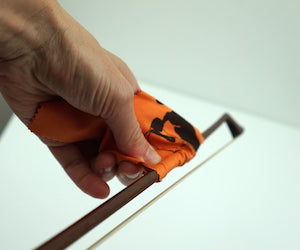Remove rosin

When playing, rosin settles in the form of rosin dust on the strings, on the varnish, on the wood and on the bow stick. The combination of sweat, rosin dust and dust from the environment is particularly aggressive and sometimes leaves a not inconsiderable layer on the body, which can negatively influence its vibration behaviour. A thick layer of rosin on the strings also creates scratching noises and prevents a freely vibrating sound. Regular cleaning with a cleaning cloth keeps the instrument clean, lets it sound unimpaired and enables a satisfying sound experience.
Use separate cleaning cloths
If you rub the body of the stringed instrument with a cloth that has rosin residue, it will damage the varnish, which was previously undamaged. When cleaning stringed instruments, one should therefore distinguish between the strings and the varnish or wood and use separate and clean cleaning cloths for each. You should also make sure that the cloths do not leave behind any material fibres that could then get caught on small splinters. Therefore, strong and tightly woven cloths are recommended. It is extremely effective to use at least two, preferably three or four different cloths: one for cleaning the strings, one for the varnish spots with rosin residues and one for the rest of the stringed instrument. The stick of the bow should also be considered.
This is how it works: always from top to bottom
There are many things you can do right when cleaning stringed instruments. The most important thing is to remove the rosin dust from all affected areas after each playing session, using separate cloths. To ensure that anything that falls off can be wiped away afterwards, it makes sense to start with the strings. Next would be cleaning the fingerboard and then the area between the fingerboard and the bridge on the varnish. The last thing to do is to wipe the rest of the instrument with a clean cloth. The violin bow is next, once the instrument has been stowed away.
Where do the cloths come from?
The cloths were designed by ema-Musik.eu especially for us.
Strings
Sheet music & exercises
Booklets on special topics such as "arm vibrato", "left-hand pizzicato as a practicing technique", "coordination and rhythm", beginners' lessons, etc.
Almost all instruments
Integrate feet
The feet support the exercise in a relaxed manner, e.g. through the clever use of nubbed massage rollers.
Strings
Fingerboard attachment
The new fingerboard attachment was originally developed for vibrato, but is also used for trills, finger pressure, double stops, etc.
All instruments
Finger fit
With warm and supple fingers, you not only reach your goal faster: it is also much more pleasant and increases your well-being when making music.
Almost all instruments
Activate balance
The good news: you don't have to do much if you want to activate your balance while exercising: Stand on one of the utensils ... while playing ...
Strings
Remove rosin
If you want to produce a beautiful sound, you should clean the strings of your instrument regularly. A good cloth is usually sufficient for this.
Fingerboard attachments and accessories
-
-
Cello
View essaysThe attachment for cello has 14 studs and is slightly longer and wider than the one for high strings.
-
Double bass
View essaysDouble bass uses the same attachment as the cellos, but has different Velcro strips for emergency fastening
-
Exercises
View bookletsSeveral booklets specifically show how to use the essay in a targeted way, from vibrato, LHP to trills, changes of register, finger pressure and more.



